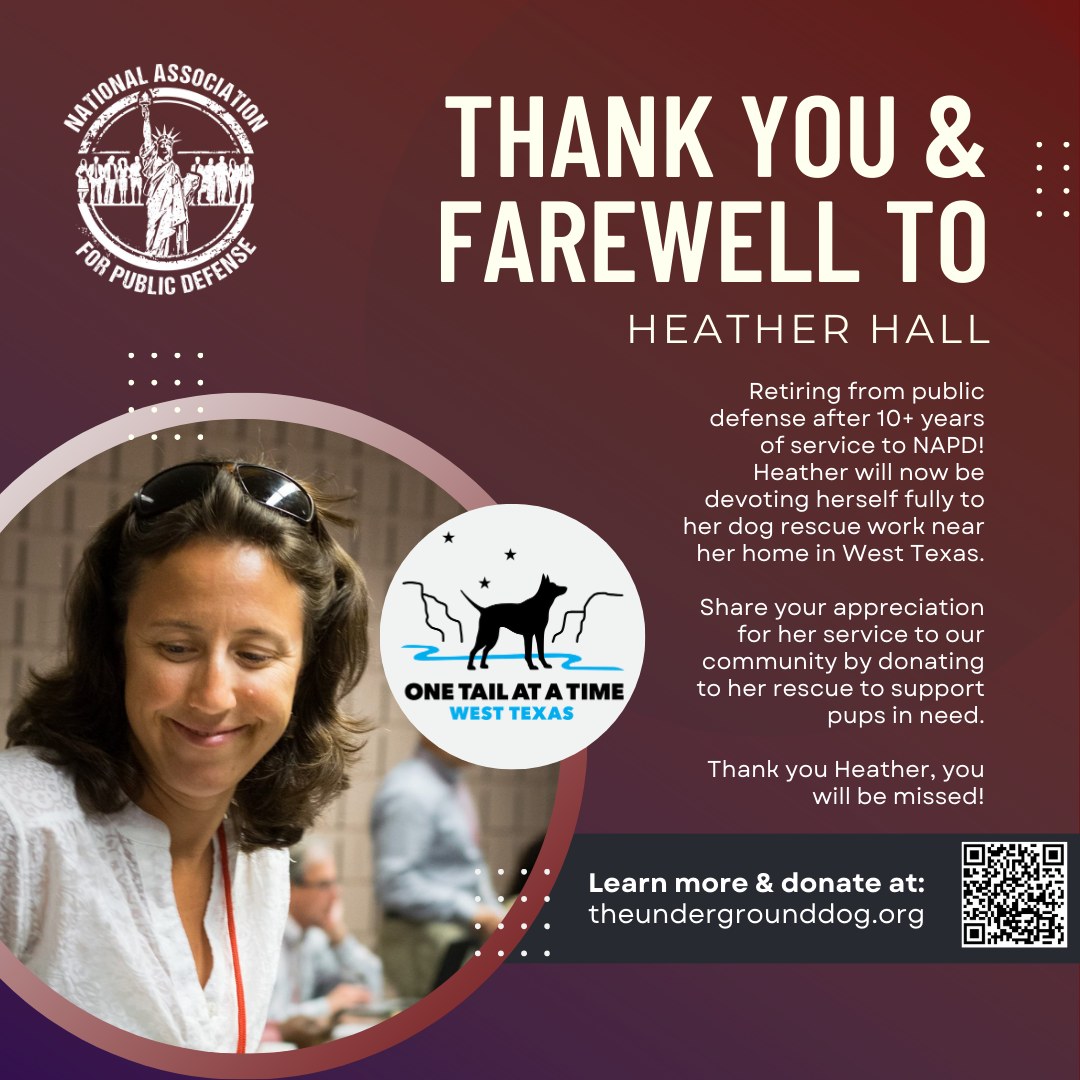This I Believe: A Farewell Essay By NAPD’s Heather Hall

As I reflect on 20 years as a public defender advocate, I’m thinking most about all the creative projects that I never quite got to, and all the ones other people are working on – that I hope to stumble across as I leave the listservs and the conferences.
Carl Jung wrote that the paradox is one of our greatest spiritual possessions and – for me at least – this has absolutely, 110%, a-bit-too-much-sometimes, been a spiritual experience. The paradox is always there: moments of ecstatic possibility and the clanging finality of concrete and barbed wire; public defenders are usually the best people I’ve ever met, though sometimes they have been the worst; our clients are almost always overwhelmingly decent, and we know them in the context of gruesome accusations; we can be so, so tired and we swear we will never, ever quit.
I used to be a person who thought that second place was first loser and that only winning mattered. I certainly don’t believe that anymore, but it’s not so simple as converting that belief system into learning to love the struggle itself. There has to be something to show for all the effort, especially when the systems we work in have pulverized the meaning of winning and losing anyway.
It’s been 20 years of trying to move the needle just a little bit. Of arguing for compassion and decency and more generous tolerance for the human experience. It’s been a lot of exposure to a lot of people in distress, inside of a legal system in distress, inside of a society that is clearly in distress.
And yet these beautiful things. A couple hours spent with wrongfully convicted Clyde Charles in Houma, LA telling a story that was straight up magic. Our equipment was cheap, the cicadas are loud, the recording preserved almost nothing, but I will never forget that story or that connection. An annual report that detailed public defender achievements every single day of the year, laid out in a neat little calendar of squares and 10-point font. The overwhelming silence and togetherness at the National Memorial for Peace and Justice in Birmingham under all those heavy, hanging monuments. So many beautiful treasures. And the terrible things too, unspeakably grotesque, locked away or out of mind entirely.
Lonely as the work is, it’s too meaningful to bear alone, and we do ourselves a disservice of understanding – much less bearing it – absent a community.
Humans have a habit of trying to redeem tragic, senseless, unfair, intractable things by creating something from it. Whether it’s pretty or ugly or significant or not, the act of creating helps us cope. Call it art. Call it whatever you want. Creating is the essential seed of togetherness.
Lyle Lovett’s ‘Simple Song’ has a line buried in the middle that sums up all my fears about those of us doing good work: “They’ll make you martyrs of your own cause / when they don’t know what cause it’s for”.
This gives me chills. This is the worst part about leaving is the story left untold; so many people being martyred around me, so many people unconscionably oblivious. It’s sad. It’s hard. It’s Sisyphean, sometimes. But also, it’s so much more.
It’s the great, full-aperture, whole-human experience we’re watching. A bridging of worlds, a place in history, a place in the long, long arc, if you will. The arc that is bending….
It means so much less to stand there alone, and so much more to be there with you.
Public defenders are storytellers by trade. They are also, as a hero of mine once said, “Elephants tied with thread.” Tell your stories. Tell their stories. Tell all the stories. Put pen to paper, words to song, paint to canvas, hands to clay, camera to print, fingers to string… step fully into the stream of whatever creative force can contain your stories.
Let them know what cause it’s for.
I know you have no time. I know you have no energy. But the story is an elephant. It is not so hard to shed the thread. It will save your clients, it will save the system, and it will save you.
This I believe.
